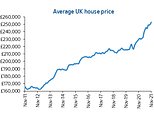House prices up 10%, says Nationwide, as a home gets £23k pricier
The average home will cost you £23,000 more than last year: House price inflation climbs back to 10% but Nationwide says the market may be cooling
<!–
<!–
<!–<!–
<!–
(function (src, d, tag){
var s = d.createElement(tag), prev = d.getElementsByTagName(tag)[0];
s.src = src;
prev.parentNode.insertBefore(s, prev);
}(“https://www.dailymail.co.uk/static/gunther/1.17.0/async_bundle–.js”, document, “script”));
<!–
DM.loadCSS(“https://www.dailymail.co.uk/static/gunther/gunther-2159/video_bundle–.css”);
<!–
House price inflation returned to double digits in November, as the property market shrugged off the end of the stamp duty holiday, according to new figures.
The average home now costs £22,966 more than a year ago at £252,687, after house prices increased by 10 per cent annually in November, against a rise of 9.9 per cent the month before, Nationwide Building Society said.
The mortgage giant said that the paandemic property booom means the average cost of a home is nearly 15 per cent higher than in March 2020, when it stood at £219,583.
However, Britain’s biggest building society said the things may be slowing at the tail end of a high octane year. Robert Gardner, Nationwide’s chief economist, said: ‘There have been some signs of cooling in housing market activity in recent months.’
Confounding expectations: House prices have rocketed in the pandemic – the opposite of what was expected when lockdown arrived
On a monthly basis, property prices increased by 0.9 per cent in November, against a 0.7 per cent rise in October, Nationwide said, with the average home adding £2,376, according to seasonally adjusted figures.
But Nationwide highlighted that the number of completed property transactions was down nearly 30 per cent year-on-year in October, amid the end of the stamp duty holiday in September.
Meanwhile, mortgage approvals fell in October fell to 67,199, the lowest since July 2020.
Mr Gardner said: ‘But this was almost inevitable, given the expiry of the stamp duty holiday at the end of September, which gave buyers a strong incentive to bring forward their purchase to avoid additional tax.
‘The number of housing transactions so far this year has already exceeded the number recorded in 2020 with two months still to go and is actually tracking close to the number seen at the same stage in 2007, before the global financial crisis struck.’
He said the market was expected to remain ‘fairly buoyant’ in the months ahead, but said ‘rising interest rates may exert a cooling influence on the market.’
All change: Annual house price growth shifts in Britain since November 2018
Approvals: Mortgage approval levels across Britain since 2010, according to Nationwide
Demand for housing has been strong during the pandemic since the end of the property freeze at the start of the first coronavirus lockdown last year, with agents reporting buyers as keen to snap up homes with more space.
The market was also stoked by Rishi Sunak’s stamp duty holiday, removing tax on the first £500,000 of a property’s purchase price, which began in July 2020, tapered down this summer and finished at the end of September.
Agents claim a shortage of homes for sale compared to demand in popular areas has also continued to support house prices.
The economy has fared better than expected and since the end of the Government’s furlough scheme there has been no sign of a major spike in unemployment.
Mr Gardner said: ‘If this is maintained, housing market conditions may remain fairly buoyant in the coming months, especially since the market has momentum and there is scope for ongoing shifts in housing preferences, as a result of the pandemic, to continue to support activity.’
Transactions: The number of completed property transactions in Britain over the past year
He said the outlook remained uncertain due to factors such as the possibility of the Bank of England raising interest rates and the impact of the Omicron variant of the coronavirus on public health and the economy.
‘Indeed, house price growth has been outpacing income growth by a significant margin and, as a result, housing affordability is already less favourable than was the case before the pandemic struck’, Mr Gardner said.
Mark Harris, chief executive of mortgage broker SPF Private Clients, said: ‘While the froth has gone, there is still plenty of activity as this will be the busiest year for the housing market since 2007 in terms of number of transactions.’
Martin Beck, senior economic adviser to the EY Item Club, said: ‘It appears that any downward pressure on property prices from stamp duty returning to its pre-pandemic level at the start of October has been countered by other factors.
‘Granted, the after-effects of the tax holiday’s end have made their presence felt in some housing indicators. According to HMRC, 76,930 properties were transacted in October, well down on recent highs and around one-fifth below the pre-pandemic norm.
‘And mortgage approvals fell in October fell to 67,199, the lowest since July 2020. Moreover, stamp duty back at its normal level is not the only headwind facing the housing market: household income growth faces pressures from higher inflation and tax rises, while uncertainty stemming from the new Omicron variant could hold back potential buyers until the situation is clearer.
‘However, what has been a measured decline in mortgage approvals since the summer bodes well for the housing market avoiding a significant correction now that stamp duty has returned to its normal level.’
Mr Beck added: ‘Uncertainty stemming from the new Omicron variant reinforces the EY Item Club’s expectation that the Monetary Policy Committee will hold off raising rates until next year. So, while house price growth is likely to slow during 2022, an outright fall seems unlikely.’
![]()


